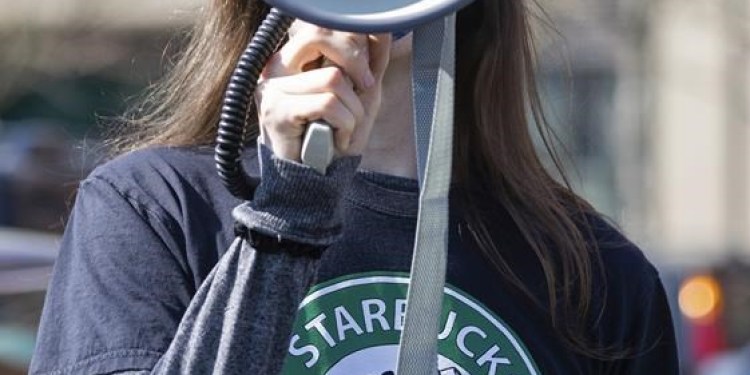This week employees at Starbucks had a mini-riot to demand more money and more connection to Unionizing, and the CEO and shareholders are not seeing eye to eye.
Leftist leaning Washington Post reported on the details of the move to unionize Starbucks employees and their demands:
A $20 an hour starting wage nationwide. A 37-hour week guarantee for full-time employees. A 100 percent employer-covered health-care plan for full- and part-time workers. Credit card tipping at all stores.
The demands from Starbucks Workers United come at a moment of heightened attention to working conditions at the coffee mega-chain. Starbucks held its annual shareholder meeting Thursday, where investors voted on whether to order a third-party assessment of the company’s commitment to international labor standards. (The results will be released in the coming days.) Workers at about 100 stores in 40 cities nationwide went on strike on Wednesday to make a point to the company’s new chief executive, Laxman Narasimhan, who started this week. Founder Howard Schultz stepped down as leader of the company on Monday, two weeks earlier than expected, though he still plans to testify before Congress next week about its labor practices.
The employees are demanding “solidarity”.
Starbucks is a leading social justice corporation, encouraging their employees to adopt Marxist policies to make changes in the social fabric of the United States, and some shareholders have seen and heard enough.
Woke policies are moving forward nonetheless, but few people even realize there is a revolt happening and it is more than by just the Marxist employees.
The CEO says he doesn’t care about the shareholders and what they want because he wants more “human connection”:
The Shareholders are not impressed. They are demanding changes too according to a Conservative watchdog group who released their side of the story.
:The National Center for Public Policy released the following statement:
Starbucks Store Closures Drive Shareholders to Request Oversight of Woke Policies
Washington, D.C./Seattle, WA – Today, shareholder activists from the National Center for Public Policy Research’s Free Enterprise Project (FEP) will follow their August lawsuit against Starbucks’ racist civil rights violations by presenting a proposal to all Starbucks shareholders asking them to demand answers regarding the coffee giant’s political agenda.
The proposal, if approved by Starbucks shareholders, seeks to compel the company’s board of directors to create a committee on corporate sustainability to review and question the impact of the company’s political and social commitments in order to determine if and how they undermine profitability and growth.
Following allegations of racism at a Philadelphia Starbucks in 2018, the company conducted an organization-wide “racial-bias education” program – led by Eric Holder, a former attorney general in the Obama Administration – that resulted in Starbucks attempting to have its baristas lead a national conversation about race. Doubling down on its wokeness, the company subsequently introduced a “Third Place policy” that invited non-customers to use Starbucks facilities regardless of the uses to which they put those facilities.
“Since instituting this Third Place policy, store managers have complained of assaults, theft and drug use in stores,” said FEP Director Scott Shepard. “This has had cascading negative effects on company sustainability. Employees must clean up drug users’ needles and other dangerous artifacts. They must deal with, and try to work around, often disruptive and dangerous non-customers who have settled in at Starbucks shops. Customers are driven to safer and cleaner places to buy overpriced coffee.”
Last summer, Starbucks announced it would be closing 16 stores due to safety concerns. “We’ve had to make the difficult decision to close some locations that have a particularly high volume of challenging incidents that make it unsafe for us to operate,” a spokesman told reporters. Signaling that the July 2022 closures were “just the beginning,” former CEO Howard Schultz forecast that “there are going to be many more.”
“And now the company poo-poos our proposal by noting that it has opened hundreds of stores while only closing about two dozen so far,” said Shepard. “But former chairman Schultz has admitted that there will be more closings exactly where the social policies he’s pushed are playing out. There are also quasi-closings, as when chairs and tables are removed from stores to combat the effects of his policies – thereby totally undermining the supposed Third Place justification for those policies.”
“Starbucks invited the exact behavior that it now laments as the cause of its store closures,” added Shepard. “Worse yet, the company flat out ignored an independent academic study that found that Starbucks’ open bathroom policy was hurting its bottom line.”
Changing company policy to now permit individual stores to make their own decisions as to whether to have an open bathroom policy is an important first step in addressing the decisions that led to the safety concerns experienced in the first place. But it is just that: a first step. Reflecting upon the company’s policy positions and advocacy decisions and assessing how they have contributed to its need to close stores due to safety issues – as FEP is calling for shareholders to support in defiance of opposition from Starbucks leadership – is necessary to keep additional stores from closing and protect shareholders’ investment.
Starbucks’ annual shareholder meeting was held virtually on Thursday, March 23 at 1:00 PM ET.
